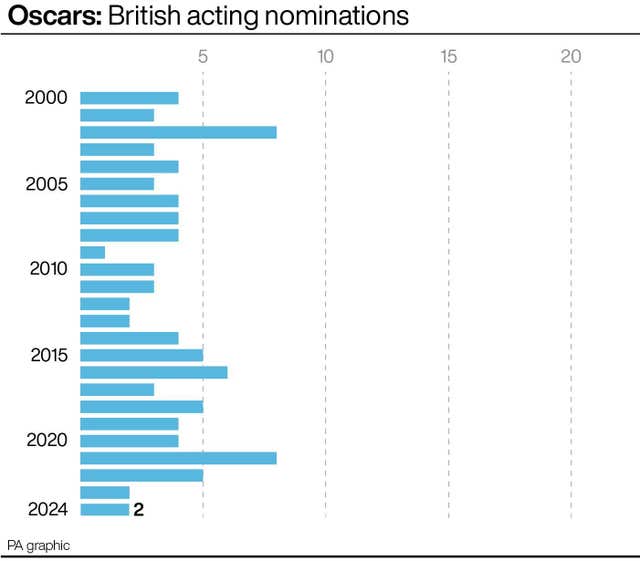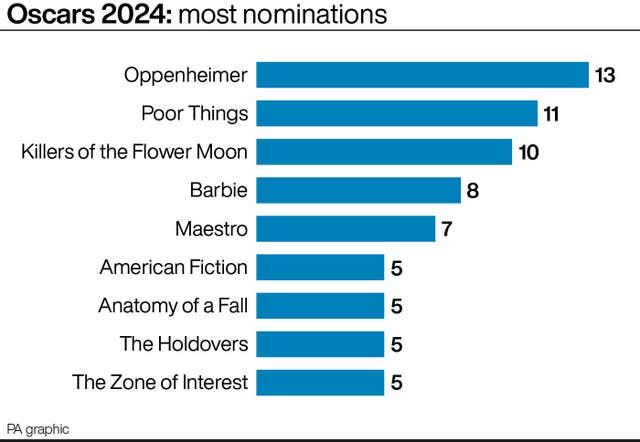Oscar nominations 2024: Key statistics
It is the first time since 2009 that there have been no UK nominees in both the best actor and best supporting actor categories.

Here are the key statistics from the 2024 Oscar nominations:
– UK acting talent
This year represents the joint poorest showing by British actors in more than a decade.
Just two performers have received a nod: Carey Mulligan in the best actress category for Maestro, the biographical drama of the life of composer Leonard Bernstein; and Emily Blunt for best supporting actress, recognising her role in Oppenheimer, which traces the life of the eponymous American physicist who played a key role in developing the atomic bomb.

It is the same number of UK acting nominees as last year, which in turn is the lowest number since 2013, when the total was also two.
It is a sharp contrast with 2021, when the UK accounted for nearly half (eight) of all the 20 acting nominations.
The average since the start of the century has been four.
No UK performers have been nominated for best actor this year, the first time this has happened since 2012, while there is no UK representation in the best supporting actor category for the second year in a row.
It is the first time since 2009 that there have been no UK nominees in both the best actor and best supporting actor categories.
– Ethnic diversity
The year 2021 saw the most ethnically diverse acting nominations in the history of the Oscars, with non-white performers making up nine of the 20 acting nominees.
This year the total is six out of 20: the same as last year and up from four in 2022.

Two of the five nominees for best actor are non-white: Colman Domingo (for Rustin) and Jeffrey Wright (American Fiction). There is one non-white nominee for best actress, Lily Gladstone (Killers Of The Flower Moon).
There are also two non-white nominees for best supporting actress: Danielle Brooks (The Color Purple) and Da’Vine Joy Randolph (The Holdovers), and one for best supporting actor: Sterling K Brown (American Fiction).
The 2024 list is an improvement on 2020, when just one of the 20 nominees was non-white.
It follows several years of criticism levelled at the film industry in both the US and UK for poor representation at award ceremonies of people from ethnic minority backgrounds.
In 2015 and 2016, there were no non-white performers nominated in any category at the Oscars.
More recently, in 2020 not a single non-white actor was nominated at the Bafta film awards.
The first non-white performer to win an acting Oscar was Hattie McDaniel, who was named best supporting actress in 1940 for Gone With The Wind.
There have been non-white winners in the acting categories 26 times: six for best actor, twice for best actress, seven for best supporting actor and 11 for best supporting actress.
– Gender diversity
There is one woman up for best director: Justine Triet, for Anatomy Of A Fall.
This is a step forwards from 2023, when no women were nominated, and is a return to the pattern of earlier in the decade, which saw Jane Campion nominated and then winning for The Power Of The Dog in 2022, and Emerald Fennell (Promising Young Women) and Chloe Zhao (Nomadland) both being nominated in 2021, with Zhao going on to win.
Campion was the first woman to be nominated twice for best director, with her first nomination coming in 1994 for The Piano.
Only eight women in the history of the Oscars have ever received a best director nomination.
Along with Triet, Campion, Fennell and Zhao, they are Lina Wertmuller (for Seven Beauties in 1977); Sofia Coppola (Lost In Translation, 2004); Kathryn Bigelow (The Hurt Locker, 2010); and Greta Gerwig (Lady Bird, 2018).
Female directors overlooked this year include Gerwig (Barbie), Fennell (Saltburn) and Celine Song (Past Lives).
– Most nominations
The blockbuster drama Oppenheimer has the most nominations, picking up a total of 13.

In second place is the dark comedy Poor Things, with 11 nominations, while western crime thriller Killers Of The Flower Moon has 10.
Fantasy comedy Barbie – the highest grossing film of 2023 – has eight nods and Maestro has seven.
– Best director
Martin Scorsese’s nomination for best director – for Killers of the Flower Moon – means he has now clocked up 10 separate Academy Award nominations in this category during his career, one more than Steven Spielberg.
Scorsese was first nominated for best director in 1981 for Raging Bull, but has won the award only once, for The Departed in 2007.
The director who holds the record for the most Oscar nominations is William Wyler, with 12 between 1937 and 1966, including three wins: Mrs Miniver (1943), The Best Years of Our Lives (1947) and Ben-Hur (1960).
Up against Scorsese in the best director category are two British filmmakers: Christopher Nolan (for Oppenheimer) and Jonathan Glazer (The Zone of Interest).
It is the first time since 2009 that two British directors have been nominated in this category in the same year.





